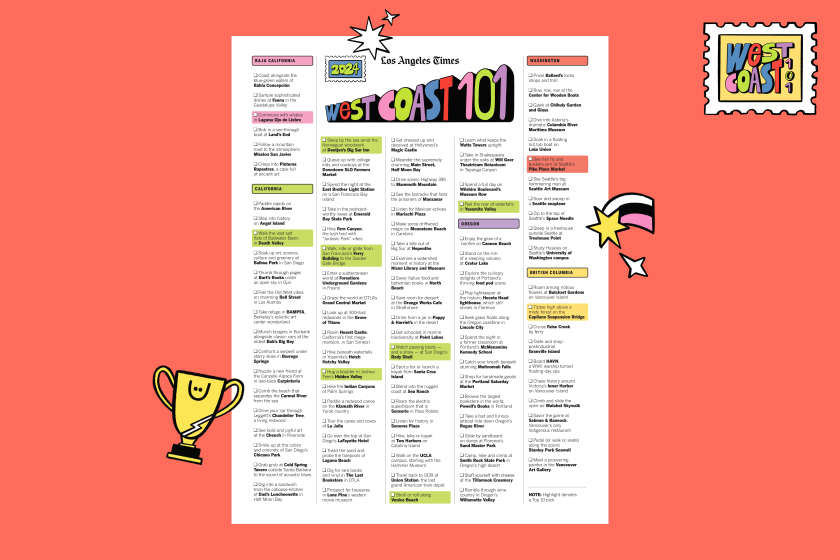Bargain Hunters Pay a Price for Web Discounts
Apparently I’m old-fashioned. The more closely I look at online discount travel agencies--especially when I look at them as they perform under pressure--the more imperfections I see.
This doesn’t mean every consumer should stay away. Online discounters such as Priceline.com, Cheap Tickets and Hotwire can play a valuable role for travelers who have flexible schedules and who value price above all else. I have well-traveled friends who swear by them.
But for those of us who don’t like red-eye flights or who bridle at the idea of buying a ticket before we know which airline it’s on, or feel vaguely nervous about ticketing transactions that involve no human voices, there are some good reasons, it seems, to resist change.
Here’s the story. I needed to buy a ticket to Charlotte, N.C., with less than 14 days’ notice, for a midweek stay. This pegged me as a business traveler and hence a cash cow. Sure enough, the lowest conventional coach fare was more than $1,600. So I turned to https://hotwire.com, one of the increasingly popular Web sites that promise discounted tickets if you’re willing to endure a little mystery (the name of the airline, for instance, and the routing, and the times of the flights). I wasn’t keen on the idea, but it looked as though I would save more than $1,000.
On Sept. 21 I agreed to pay $529 for a round-trip ticket, then learned I would be flying United, connecting through Chicago. Not ideal, but OK.
On Oct. 1, when I stepped to the United counter two hours ahead of flight time, I learned that my flight had been canceled.
Now, here’s where I bear some blame. If I had double-checked flight times before leaving the house (as many airlines and agencies now urge for foreign and domestic flights), I could have avoided some of the hassle that followed.
But I didn’t, so I didn’t know that my original flight had been canceled on Sept. 22, the day after I bought my ticket. Many of the ticket-holders, the gate agent told me, had been reassigned to an earlier departure, scheduled for takeoff ... a few minutes before I got there. My only option, the agent said, was the next United connection to Charlotte, taking off in about 11 hours. It was a red-eye that would get me to Charlotte at 9 the next morning.
I knew there was also a nonstop US Airways flight, with empty seats, due to leave LAX for Charlotte in a couple of hours.
Seasoned travelers will say, “What about Rule 240?” That’s the old federal rule (predating industry deregulation in 1978) that basically requires carriers to book you on another carrier if it’s the quickest way to your destination when your airline has delayed or canceled your flight. These days it’s more tradition than rule (and there are exceptions for bad weather and some other factors).
But it did nothing for me.
First, the United gate agent told me that the airline hadn’t warned me of the canceled flight because it didn’t have my phone number. (I had given Hotwire my phone number and e-mail address.) The United agent also said that because I had bought a discount ticket from Hotwire (rather than a conventional ticket), she couldn’t send me to US Airways. For that, she said, I had to talk to Hotwire.
Talking to Hotwire was the next challenge. When an agent--Steve--took my call after 10 minutes on hold, he offered a few provocative details but could not help.
The first provocative detail was that United hadn’t told Hotwire about the cancellation until that morning. The next provocative detail was the opposite of that. Late in our hourlong conversation, he conceded that United had indeed passed word to Hotwire of the canceled flight on Sept. 22. Whatever the truth, neither Hotwire nor United sent me an e-mail or left me a telephone message.
I might have been willing to forgive all this if Hotwire had been willing to put me on the next flight to North Carolina. But no. Steve said he wasn’t allowed to book me on the US Airways flight, and (after putting me on hold for many more minutes) he couldn’t talk a United phone agent into doing anything for me either. Together, Hotwire and United sold me a product (that is, an Oct. 1 flight to North Carolina), failed to deliver it and failed to tell me they wouldn’t be delivering it. At least they did nothing for me as long as I seemed to be a regular consumer.
When all arguments with Steve were exhausted, I told him I was a reporter on the travel industry beat and that I’d be writing about this. He put me on hold again and came back with a sunnier outlook: They saw a way to get me on that US Airways flight after all.
I said no thanks.
Instead, I said, I would be writing a column about what a regular consumer might encounter.
Is this what most regular customers should expect? No, said Hotwire spokeswoman Amy Bohutinsky. Reviewing my case, she said the company erred by not contacting me, then again by declining to book me onto that US Airways flight. In apologizing, she noted that in the three weeks after Sept. 11, Hotwire handled 35,000 schedule changes, and some of them fell through the cracks. (If another consumer is surprised by a schedule change and ends up in a situation like mine, Bohutinsky said, the only real choice is to take the flight that’s offered, call Hotwire when the trip is over and speak to a supervisor.)
Does United bear blame in this mess? United’s customer service people said no, and Hotwire officials agreed. The unpublished fares offered by discount agencies don’t come with the same “Rule 240” protections that costlier tickets carry, Bohutinsky noted. To this, I say that perhaps United is responsibility-free by the letter of the law. But United chose to sell tickets through Hotwire and trusted Hotwire to pass word of scheduling changes to me. And come to think of it, who owns Hotwire? A consortium that includes six major U.S. airlines. One of them is United.
Anyway, I took that red-eye to Chicago, with the connection to Charlotte. Then, on the way back, good luck replaced bad: United gate agents allowed me (traveling anonymously) to shorten a long Chicago layover by flying standby on an earlier return trip to LAX. I was grateful, and the letter of the law did not require it.
The lessons in this are many, and they aren’t confined to one airline or one ticket agency.
First, in this unsettled environment, it makes sense to double-check departure times before leaving home.
Second, if you book a ticket through a discount agency like Hotwire or Cheap Tickets or Priceline.com, you may save hundreds of dollars up front, but you may find that you get less help and have less flexibility if something goes wrong. If the savings are great enough, it may be worth the risk. But know the risk. Ask about and read the restrictions.
And when you think you’ve been wronged on the road, it’s important to complain politely but immediately and firmly. With some planes half-empty and the travel industry desperate for customers, somebody, somewhere, sooner or later, is bound to see a chance to profit by treating us better.
*
Christopher Reynolds welcomes suggestions, but he cannot respond to letters and telephone calls. Address comments to Travel Insider, Los Angeles Times, 202 W. 1st St., Los Angeles, CA 90012; e-mail travel@latimes.com.
Sign up for The Wild
We’ll help you find the best places to hike, bike and run, as well as the perfect silent spots for meditation and yoga.
You may occasionally receive promotional content from the Los Angeles Times.




